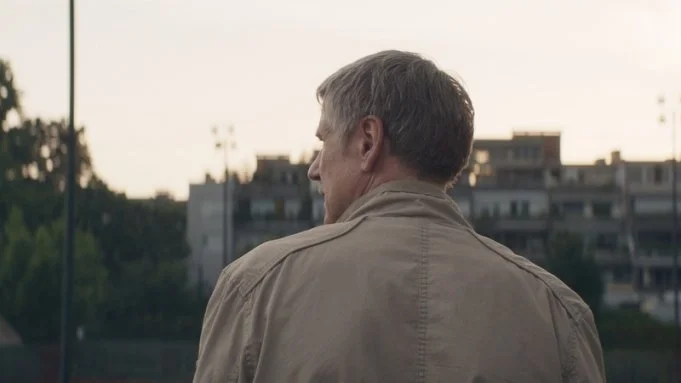Film reviews: Red herrings and real-life intrigue at the European Union Film Festival
Three thought-provoking picks, including the wickedly bleak Slovenian opener Inventory
In the Slovenian thriller Inventory, high-stakes paranoia sets in when a man suddenly finds a bullet ripping through his apartment window.
The Cinematheque presents the European Union Film Festival November 12 to 28
THE ANNUAL EUROPEAN Union Film Festival returns to The Cinematheque on November 12 for its mostly online 26th year.
As a political entity it’s a shambles, but the EU can still pull together a pretty good night at the movies. To get you started, here are three that we liked a lot:
Inventory
Screening November 12 at 7 pm at The Cinematheque and streaming November 12 to 13
To be alone is the fate of all great minds, said Schopenhauer. And the same goes for all the mediocre ones, says the film Inventory.
In this wickedly bleak opener to the festival—the one film to get an in-cinema screening at The Cinematheque on Friday (November 12 )—a middle-aged man named Boris descends into a kind of cleansing paranoia as the illusions of security are mercilessly stripped from his world. Played by Rados Bolcina, Boris is a likably ordinary chap with a decent university job, loving wife, adult son, and a life of modest, reassuring routine. All of that is upended in the blink of an eye when a bullet inexplicably rips through his apartment window, burying a slug in the drywall. Is someone trying to kill him? An ineffectual police investigation offers some red herrings while Boris is forced, gradually, to suspect those closest to him.
The film has a neat way of raising a possible culprit or motive—for a moment it seems like Inventory might become a Kafkaesque thriller about two men with the same name trying to murder each other—before tearing off in an entirely new direction. Like Boris, we’re left with little more than the sense that existence has an appalling barrenness at its core, and that each soul makes its journey in terrified solitude. A comedy, in other words, pitched so low in writer-director Darko Sinko’s debut feature that only dogs can hear it, which is exactly what I want from my Slovenian cinema. Actually, Darko Sinko would make a great alternative title.
The Jump
Streaming November 23 to 24
In November 1970, Lithuanian Simas Kudirka leapt onto a Coast Guard boat from a Russian ship anchored off Martha’s Vineyard and begged for asylum. For the next 12 hours, the Captain and crew tried to protect him until the order finally came down to return Kudirka to the Soviets. He was beaten unconscious and dragged back to certain imprisonment, maybe even death. Interviewed half a century later for this outstanding doc, the captain of the US Vigilant weeps as he tells the story, while Kudirka himself—now an impish, bow-legged octogenarian—returns to the American vessel to lead the camera on a frantic reenactment of his ordeal.
This episode was just the beginning of Kudirka’s extraordinary tale. His plight triggered a wave of protests that forced President Richard Nixon to publicly apologize and prompted delicate diplomatic efforts to hatch the would-be defector from the Gulag and have him sent back to the States. In a new interview, a decrepit Henry Kissinger shows up to prove that Henry Kissinger is still alive, but also to remind us that Cold War operators were ready to capitalize on the moment. And so, with State Department help, Kudirka eventually made it to the Bronx, family in tow. But this is where it gets really interesting. Interviewed by Bill Moyers in the late ’70s, Kudirka can’t conceal his growing disillusionment with western excess. He’s hardened and wiser still when the camera catches him in Santa Monica in 1991. Recently filmed wandering inside the neon corporate Babylon of Times Square, Kudirka finally says, “This is not for me.” He’s an endearing figure, constitutionally honest but unfailingly polite, while Giedrė Žickytė’s film is a marvellous work of counter-mythography, scratching away between the lines of a story that was always squeezed—as in a popular 1978 TV movie starring Alan Arkin—for its value as blunt propaganda.
25 Years of Innocence: The Case of Tomek Komenda
Streaming November 26 to 27
A notorious miscarriage of justice is the subject of another debut feature, this time by Poland’s Jan Holoubek. Tomasz Komenda was framed by police and then sentenced to 25 years in prison for a rape-murder that he couldn’t possibly have committed. Holoubek’s telling of the story is solid festival fare, high on production value and performance, absorbing from start to finish. As Komenda, the weedy Piotr Trojan goes the distance in challenging the viewer’s sympathies, consistent with some other commendable choices made by the filmmakers.
There are echoes of Peter Medak’s Let Him Have It (also based on a true story) and a real-life plot twist right out of The Shawshank Redemption, but 25 Years levels up the brutality on display, while dialling down the sentimentality, perhaps reflecting the lengths currently needed to fire up middle-class audiences in their generally fruitless rituals of liberal outrage. Another explanation, maybe less honourable, but preferred by me, is that Houlobek just really enjoys the pure movie mechanics of making us wince.














